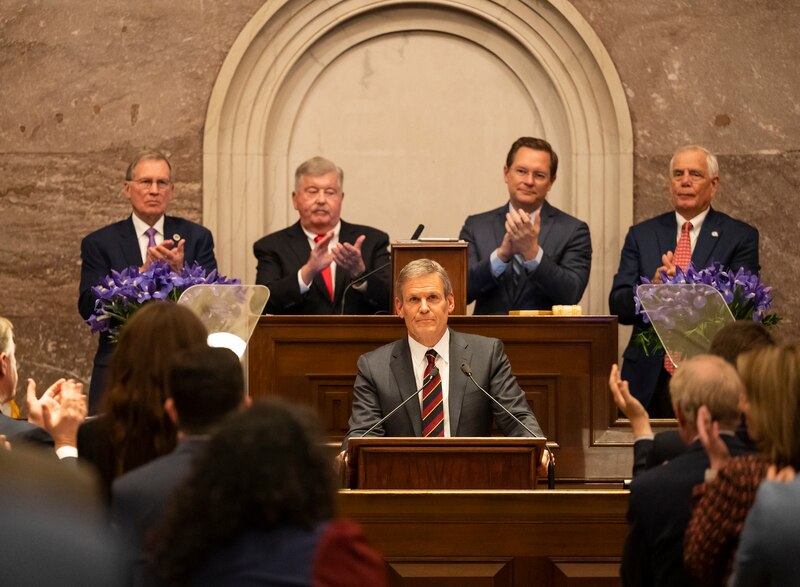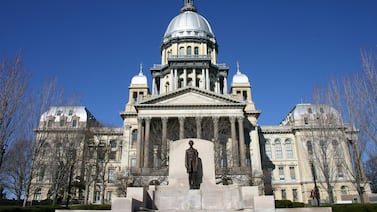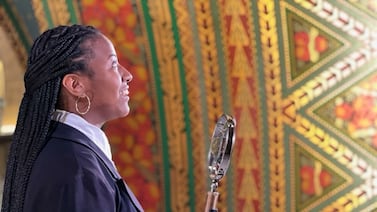Tennessee Gov. Bill Lee announced Monday that he will call the legislature back Aug. 21 for a special session to address firearms and public safety concerns following a deadly school shooting in Nashville this spring.
“There is broad agreement that action is needed,” Lee said in a statement.
The goal, he said, is to “pursue thoughtful, practical measures that strengthen the safety of Tennesseans, preserve Second Amendment rights, prioritize due process protections, support law enforcement and address mental health.”
The governor also invited Tennesseans to provide input about the issues through an online form.
Lee’s announcement came just over two weeks after GOP lawmakers raced to complete their business early for the year while refusing to take up gun reform legislation from the Republican governor or their Democratic counterparts.
It was an anemic ending to a tumultuous session gripped by massive citizen protests after the shooting at The Covenant School left six victims and the gunman dead. The tragedy sparked calls for stricter gun laws and led to the ouster of two young Black lawmakers who took the protest to the House floor. Both men, Reps. Justin Jones of Nashville and Justin Pearson of Memphis, were quickly reinstated by local officials.
Meanwhile, gun violence continues to ravage communities across the nation, most recently in Texas where a gunman killed eight people and wounded seven others during a weekend shooting spree at a Dallas-area outlet mall.
In Tennessee this spring, lawmakers approved new policies and funding to further fortify school campuses, including at private schools like Nashville’s Covenant. Legislative discussions about limiting gun access mostly focused on people who are having a mental health crisis. Authorities said the Nashville shooter, who was later killed by police, was seeing a doctor for an “emotional order.”
Lee signed an executive order aimed at strengthening background checks on firearm purchases. He also proposed legislation that he said would help keep guns out of the hands of people deemed at risk of hurting themselves or others, his first embrace of a gun reform measure in one of the nation’s most gun-friendly states.
But his proposal hasn’t garnered much support from either side in the intense debate about gun access.
Joining forces with gun lobby groups, Republican leaders called Lee’s plan a “non-starter” and ended the session without taking up the measure. Groups advocating for gun control argued that Lee’s proposal — which allows three to five days before a court hearing would occur after law enforcement petitions for an order to seize firearms — doesn’t go far enough. That waiting period “could be the difference between life and death,” according to the group Everytown for Gun Safety.
Lee has avoided the phrase “red flag law” in describing his desire for new “order of protection” legislation.
“My proposal is not a red flag law,” he told reporters last week in Memphis. “It is unique to Tennessee (and) based on existing laws that we have in place.”
He continued: “We all believe that we should find a way to separate those who are of a dangerous mental condition who are a danger to themselves and others from having access to weapons. I have asked the General Assembly to look at multiple ways to do that. I’ve actually given a proposal to find a way forward to do that. We have to remember, too, that it is important that while we find a way to separate those that are a danger from weapons, we also have to protect the constitutional rights of every Tennessean. That is a balance that we have to find going forward.”
On Monday, Lee said he expects the General Assembly to bring forth its own ideas and pledged that discussions will take place throughout the summer before the session convenes.

But Doug Kufner, a spokesman for House Speaker Cameron Sexton, was cool about Sexton’s leadership in forging a workable solution.
“The speaker will continue his travel schedule throughout the state this summer and fall to assist members and meet with Tennesseans on a wide array of issues and policies,” Kufner said. “He is looking forward to those discussions as we all await Gov. Lee’s proposed legislative package for the announced special session.”
Democrats, by contrast, called the special session an opportunity to address the longstanding problem and growing threat of gun violence.
“The people demanding action have brought us to this moment,” said Sen. Raumesh Akbari of Memphis, “and now we need every Tennessean who cares about this issue to tell their elected leaders to show up in August and support legislation that truly addresses gun violence.”
Akbari, who is Senate minority leader, added: “Once we see the official call for the special session, we’ll know exactly what kind of legislation can be introduced. But we already know that broad majorities of voters, from all parts of the state and all political backgrounds, support common sense gun reforms, like extreme risk protection orders, waiting periods, and universal background checks.”
According to a recent Vanderbilt University poll, 82% of registered Tennessee voters support a so-called red flag law that would temporarily restrict access to guns for individuals who are at a high risk of harming themselves or others.
Two former governors, Republican Bill Haslam and Democrat Phil Bredesen, wrote recently that red flag laws are a good place to break through the impasse over gun reform.
And in an opinion piece published last week by Forbes, former Senate Majority Leader Bill Frist of Tennessee, a Republican who is also a physician, wrote that lawmakers should not only pass a red flag law, but consider raising the legal age for purchasing guns and banning high-capacity magazines and assault-style weapons.
Frist called firearm-related deaths “an official public health crisis.”
Marta Aldrich is a senior correspondent and covers the statehouse for Chalkbeat Tennessee. Contact her at maldrich@chalkbeat.org.
Chalkbeat reporter Laura Testino contributed to this report from Memphis.







